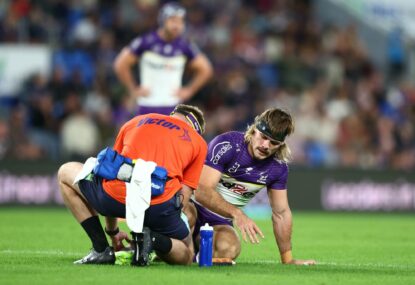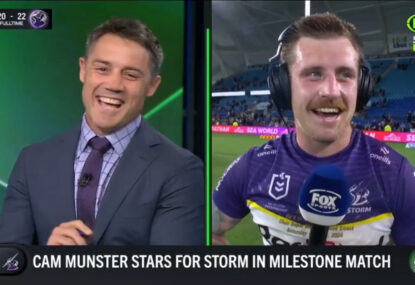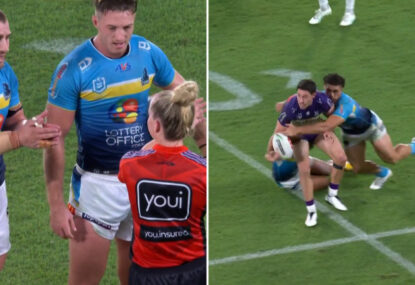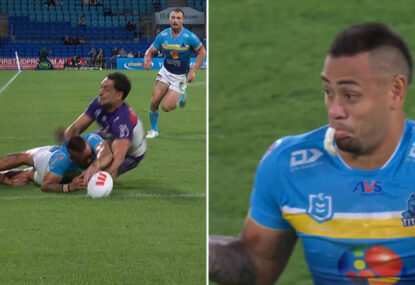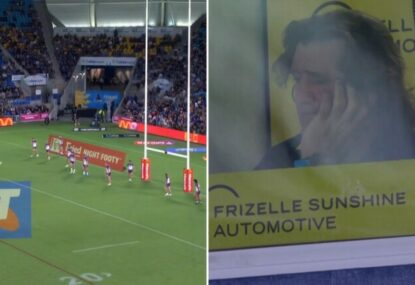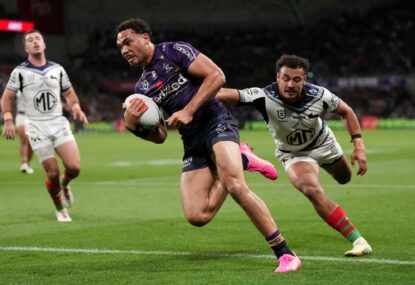Rugby league’s greatest crimes have changed colour, from blue collar to white collar. The appalling off-field player behaviour which blighted 2009 has improved out of sight this year, despite Wests Tigers halfback Robert Lui finding himself charged with nine offences, including assaulting his pregnant girlfriend.
But in its place have appeared devils of a different hue – salary-cap rorts and match-fixing allegations – which could present an even more dire threat to the code.
They have marred a year in which the game was taking many small steps forward, only to be hit by a crunching tackle that propelled it one giant step backwards.
The Melbourne Storm’s salary-cap cheating amounted to one of the greatest frauds in Australian sport.
Setting up two sets of books was no momentary lapse of ethics.
It was a cold, calculating, deliberate and highly orchestrated deception – institutionalised fraud in the offices of the game’s premier team.
The rorts involved cars, flights, gift vouchers and other backdoor payments.
The club was caught red-handed cooking the books to the tune of $3.17 million over five years, and was on schedule to be $1.3 million over the cap next year.
This meant that when the club started cheating the system, the previous major salary-cap rorting scandal involving the Bulldogs was just a few years old, still fresh in everyone’s minds.
“We had some rats in our ranks,” said John Hartigan, chairman of the club’s owner News Ltd.
Four directors were sacked.
The matter is still under police investigation.
A News Ltd-ordered probe identified 13 Storm players who received payments or benefits outside the salary cap from third parties.
None co-operated in the investigation.
The NRL hit the Storm with the strongest punishments imaginable – two premierships stripped, a $500,000 fine, $1.1 million in prize money to be handed back and a guaranteed wooden spoon with zero points in 2010.
For the first time ever a club had to play through a season knowing it could not win any competition points no matter how many matches it “won”.
With such a lack of incentive, every Melbourne Storm game loomed as a lottery.
As it turned out, the previously peerless champions won just 14 out of 24 matches.
Even that would have been good enough for fifth spot and a place in the finals.
Another bombshell hit league late in the season in the form of allegations of a betting scandal, a matter which is now also in the hands of police.
NRL boss David Gallop warned anyone found guilty of involvement would face life bans from the game.
The scandal concerned the round 24 match between North Queensland and Canterbury in Townsville.
Betting agencies alerted the NRL when a large number of bets were placed on the Cowboys to open the scoring via penalty goal – an option which normally does not attract much attention.
Gallop was spot-on when he described the possible manipulation of seemingly minor parts of the game as “a matter of the most serious concern”.
If league does have a match-fixing problem to stamp out it is best stamped out as swiftly and forcefully as possible, or the game’s credibility risks descending to the lows plumbed by cricket and its attendant bookmaker groupies.
These white-collar scandals set back a code which had been recovering well from a horror year of off-field behaviour.
Barely seven players wrote their names into the NRL shame file in 2010 compared with 38 last year – around 10 per cent of the entire first grade playing roster.
Most of their indiscretions involved alcohol.
North Queensland star Jonathan Thurston was locked up and charged with a public nuisance offence after being asked to leave Brisbane’s Treasury Casino.
But the party with most right to feel aggrieved was probably the club paying wages to a captain out on the town while on crutches recovering from injury.
Manly fined its giant winger Tony Williams and ordered him to undertake community service after he was charged with mid-level drink driving.
The Bulldogs sacked back-rower Lee Te Maari for a driving offence which proved the last straw following fines for other off-field incidents.
Cronulla hit captain Paul Gallen with a $10,000 fine, half of it suspended on a good behaviour bond, after he committed what was fast becoming league’s misdemeanour of choice – urinating in public.
Manly star Brett Stewart wept in court during his sexual assault trial, though that case stemmed from an incident 18 months earlier.
The most serious new incidents were the domestic violence case involving Robert Lui and the drugs trial involving Newcastle Knights Danny Wicks and Chris Houston.
Wicks was stood down by the club after being charged with six counts of supplying drugs and two counts of possession.
He was alleged to be part of a significant network supplying amphetamine, cocaine and ecstasy in northern NSW.
Houston had his contract terminated after being charged with four counts of supplying drugs.
The case is still before the courts.
Despite the seriousness of such cases, the 2010 season bears no resemblance to the depravities of 2009 which included stories of players defecating in a hotel, bashing women, biffing not only each other but a coach and a sponsor, street fighting, binge drinking, drink driving, pill popping, sexual assault and racial abuse.
Off the field, it was an utter disaster, producing a tidal wave of negative stories featuring some of the biggest names in the game.
This year, by contrast, has featured tales of redemption involving a string of players with previously bad form.
Todd Carney, once deregistered from the NRL, appears to have turned his life around as a star for the Roosters, previously a hotbed of blokey behaviour but now rejuvenated under new broom coach Brian Smith.
Greg Bird, once sentenced to eight months jail for glassing his girlfriend, a conviction later quashed, has been exemplary on and off the field this season for the Gold Coast.
Brett Seymour, sacked first by the Broncos and then Cronulla for repeated alcohol-related incidents, has also rediscovered himself with the Warriors.
But league’s new demons are issues which strike at the integrity of the game itself, rather than the off-field integrity of those who play it.
If fans can’t trust that all teams are on a level playing field, and that all players are trying their level best all of the time, the game loses credibility.
And without credibility there is no game.






























































































